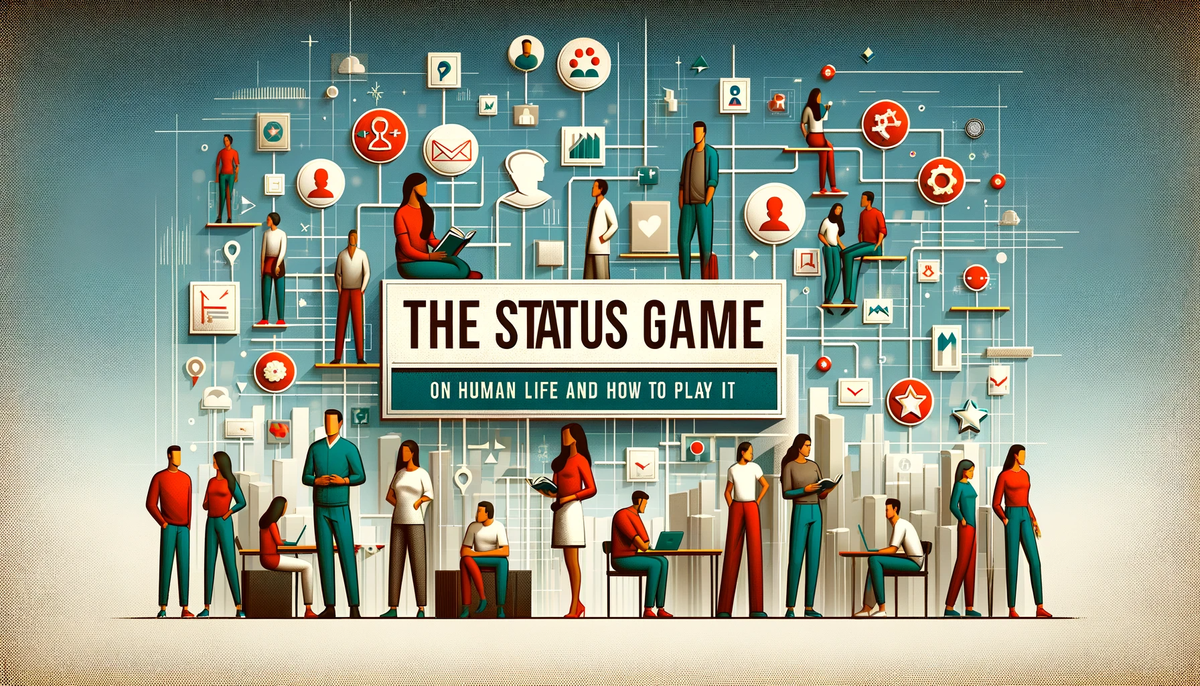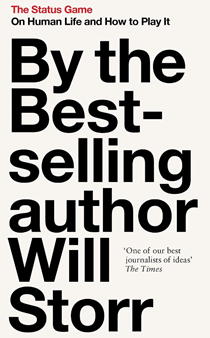The Status Game

This post will briefly cover The Status Game: On Human Life and How to Play It by Will Storr.

David Shapiro has a great YouTube channel, mostly dealing with AI and the effects it is having/will have on us. He's mentioned this book in a few of his videos, and I'm glad he did. As someone who misses a LOT of unspoken communication, I've had to explicitly learn a lot of what other people seem to take for granted in that area, and this is a great book for that.
The main point of the book is that, as highly social primates, we're evolved to seek status from each other, and there are multiple pathways to it. Having it brings a host of benefits (think of what a great reputation can get you) and losing it can be disastrous for our health and wellbeing.
We all want status to some extent, yet seeking status, or rather, being seen to seek status, generally lowers our status. As such, we don’t often admit that status is our motivation, and we may not even realize we're doing it. In my case, I would never have thought of the desire to take 1st at a powerlifting meet as seeking status, but it absolutely is. It's obviously not the only reason for it, but now that I know to look for it, it's definitely a reason. (Now if only I could get my wife to care. Too bad powerlifting is a boring spectator sport.)
Status Games
According to Storr, there are three main types of games we play, three areas we can excel in, to gain status: success, virtue, and dominance. Not everything fits neatly into one of these categories (e.g., beauty), and many areas have aspects of multiple games, but it's an exceptionally useful framework nonetheless. As Sam Harris said while interviewing Storr, "This is one of those things that, once you begin thinking about it, you see it everywhere and realize that it was doing its mad work all the while without you thinking much about it."
Success Games
Our modern Western society is mostly a success game. Capitalism is, by and large, based on praising and rewarding success. A successful entrepreneur gains not just wealth, but a reputation that causes people to look up to her. Gaining status in this area opens doors and presents opportunities that would not otherwise be available.
This can be great. Storr points out that much of our advancement in science has come from the pursuit of status via accumulations of useful knowledge. In particular, this pursuit exploded once the printing press made the spread of such a reputation exponentially easier. It's one thing to be well known for your learning in your home town, and another thing entirely to be known across the continent.
Of the three games Storr discusses, success games probably have the greatest benefits and the fewest negative effects, but this is not to say it's a perfect system. One downside is that it is (like just about everything), an unfair game. Personally, I have no doubt had an easier time gaining status due to my height alone. I did nothing to earn that, but study after study has found that height is correlated with perceptions of competence and life-long earnings. I have no doubt I would've had a much lower chance of being admitted to the Air Force Academy if I had been 5'6" instead of 6'4". The fact that I'm male and white, two more things I was simply given at birth, undoubtedly also played a meaningful role.
Virtue Games
Virtue games have historically been tied to religion. That's slowly changing, but regardless of the source of your morals, being seen to abide by them gives you status points with others who hold those same views.
This can be great. While there are reasons to be skeptical of conspicuous charity, there is no doubt it is also beneficial. Take Bill Gates as an example. He has undoubtedly used his charitable donations to help alleviate his image as a ruthless businessman, but he also does a lot of meaningful good in the world, and is rightly praised for it. Others see the effect, see that charity is a valid strategy for gaining status, and are encouraged to do the same. This would not happen if he donated money anonymously.
Unfortunately, there is no requirement that the virtues one embraces are actually good for humanity. "Virtuous" actions can be abhorrent and still gain status, so long as they match the group's mindset. A martyr for a cause is often rewarded with great status, status that redounds to his family's benefit, even if he has taken his own life and the lives of many innocents in the process.
Cults are an extreme example of virtue games gone wrong. If you strictly abide by the groups rules, you gain status. If you have the audacity to question the leader, you lose status. Within the framework of the cult, blind obedience and unquestioning loyalty make a perverse kind of sense. If you share the beliefs deeply enough, or at least act as if you do, there may be no action that is unthinkable, so long as it comes from the leader.
Dominance Games
Dominance games are the most obvious, and generally the most dangerous. "My dad can beat up your dad." "Might makes right." "Political power grows out of the barrel of a gun." The military is an obvious example of a dominance game.
While the prevalence of direct dominance through physical violence has gone down in society as a whole, many areas remain. Sports, while largely a success game, often have an aspect of dominance, and this is most blatantly true in combat sports.
We're most likely to fall back on dominance when other status games fail. The most common cause that violent offenders give for their assaults and murders is a lack of respect from the victim. Likewise, an analysis of 94 wars found that 67% were primarily motivated by a perceived lack of national standing, with only 18% being primarily about national security.
Resilience
For those playing a single game, losing status can literally be the difference between life and death. During the Great Depression, many people playing the success game committed suicide, not because they were broke and destitute in absolute terms, but because going from 20 million dollars to 2 million dollars devastated their sense of self-worth.
The more groups we belong to, the more sources of status we have, the more resilient we are to perceived loss of status in any one area. Losing status in the success game matters less if you're also playing the virtue game, or even just playing with success in multiple ways and with several communities. If you lose the success symbol of money, but still have success in sports and beauty, the loss will still sting, but it is less likely to be devastating.
Conclusion
I agree with Shapiro, and I highly recommend this book. While it's dangerous to take any single overarching idea to far, this is definitely one that makes sense of a wide range of human actions.
I didn't cover the aspect of us vs them, of the brain being a "hero maker", rather than a reliable self-judge, but that's another interesting topic in the book. If you're interested in that, I'd also recommend The Righteous Mind: Why Good People Are Divided by Politics and Religion by Jonathan Haidt.